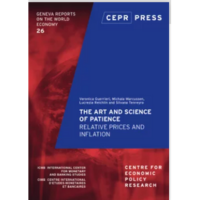Read the latest analysis and reports produced by our faculty.
2023

Geneva 26: The Art and Science of Patience: Relative prices and inflation
Veronica Guerrieri, Michala Marcussen, Lucrezia Reichlin, Silvana Tenreyro
Following more than thirty years of low inflation, advanced economies saw a surge in inflation driven by an unprecedented concomitance of factors linked to the Covid-19 pandemic and the Russian invasion of Ukraine. Central banks around the globe have responded with a sharp tightening of monetary policy.
The debate over the drivers of elevated core inflation can be split into two broad interpretations: (i) de-anchoring of inflation expectations and a possible profit and wage spiral, which calls for a tighter monetary policy stance; or (ii) a reflection of the relative price adjustments needed for efficient resource reallocation in response to a series of asymmetric shocks, suggesting a more accommodative stance is desirable.
This report takes stock of what has happened, including the monetary policy response in the euro area and the US, and discusses the challenges ahead.
The authors show that supply chain disruptions and demand changes induced by the pandemic and the increase in commodity prices hit different sectors with variable intensity, prompting a large shift in relative prices and a slow but persistent response of core inflation. This was particularly important in the euro area, which has typically experienced persistent inflation in response to energy shocks.
The authors develop a stylised model that shows how underlying nominal rigidities prevent sectoral relative prices adjustment in response to an energy shock, generating less reallocation of production across sectors than in a setting with flexible prices.
While highlighting the costs and risks associated with different monetary policy choices, the authors suggest that de-anchoring risks are limited and that when an economy with nominal rigidities is hit by an uneven shock, it may be necessary to be patient and tolerate somewhat higher inflation to facilitate the relative price adjustment and the efficient allocation of resources across sectors. The stability of long-term inflation expectations observed in the recent past is a credibility bonus that central banks can exploit to communicate the rationale for taking a bit longer to return inflation to target.
Read here.
November 2023
Air quality improvements alone justify phasing out coal-fired power | VoxDev
Phasing out coal power is key to fighting climate change. This article by Tim Besley and PhD student Azhar Hussain at LSE Department of Economics, shows that air quality benefits alone are sufficient to justify a move away from coal-fired power.
Read here
November 2023

The Search for Good Jobs: Evidence from a Six-year Field Experiment in Uganda | CEPR
Oriana Bandiera, Vittorio Bassi, Robin Burgess, Imran Rasul, Munshi Sulaiman, Anna Vitali
There are 420 million young people in Africa today. Understanding how youth search for jobs and what affects their ability to find good jobs is of paramount importance. We do so using a field experiment tracking young job seekers for six years in Uganda's main cities. We examine how two standard labor market interventions impact their search for good jobs: vocational training, vocational training combined with matching youth to firms, and matching only. Training is offered in sectors with high quality firms. The matching intervention assigns workers for interviews with such firms. At baseline, unskilled youth are optimistic about their job prospects, especially over the job offer arrival rate from high quality firms. Those offered vocational training become even more optimistic, search more intensively and direct their search towards high quality firms. However, youth additionally offered matching become discouraged because call back rates from firm owners are far lower than their prior. As a result, they search less intensively and direct their search towards lower quality firms. These divergent expectations and search behaviors have persistent impacts: vocational trainees without match offers achieve greater labor market success, largely because they end up employed at higher quality firms than youth additionally offered matching. Our analysis highlights the foundational but separate roles of skills and expectations in job search, how interventions cause youth to become optimistic or discouraged, and how this matters for long run sorting and individual labor market outcomes.
Read here.
August 2023

How Big is the Media Multiplier? Evidence from Dyadic News Data | CEPR
Tim Besley, Thiemo Fetzer, Hannes Mueller
This paper estimates the size of the media multiplier, a model-based measure of how far media coverage magnifies the economic response to shocks. We combine monthly aggregated and anonymized credit card activity data from 114 card issuing countries in 5 destination countries with a large corpus of news coverage in issuing countries reporting on violent events in the destinations. To define and quantify the media multiplier we estimate a model in which latent beliefs, shaped by either events or news coverage, drive card activity. According to the model, media coverage can more than triple the economic impact of an event. We show that within our sample, media reporting more than doubled the effect of events in Tunisia and speculate about the role of the media in driving international travel patterns. This concept can easily be expanded to other contexts and settings.
Read more here.
August 2023
The Economics of Creative Destruction
New Research on Themes from Aghion and Howitt
(Book) John Van Reenen
A stellar cast of economists examines the roles of creative destruction in addressing today’s most important political and social questions.
Inequality is rising, growth is stagnant while rents accumulate, the environment is suffering, and the COVID-19 pandemic exposed every crack in the systems of global capitalism. How can we restart growth? Can our societies be made fairer? Editors Ufuk Akcigit and John Van Reenen assemble a world-leading group of social scientists and theorists to consider these questions and, in particular, how ideas about the economics of creative destruction may help solve the problems we face.
Find here.
July 2023
The role of geography in determining inequality between Italians
Juraj Briskar, Edoardo Di Porto, José V Rodríguez Mora, Cristina Tealdi
The relatively late unification of Italy and the complex history of the peninsula have created a well-known narrative about the prosperous North and the poor South. This column shows that, despite very large differences in average income levels across provinces, province of birth can only explain 3.4% of lifetime income inequality among Italians, and just 1.8% for males. The figure for females is as high as 10.2%, reflecting regional differences in participation. Differences between rich and poor within provinces are orders of magnitude larger than average differences across them. While tackling regional disparities may have beneficial effects, it will not significantly reduce the level of inequality between Italians.
Read here.
June 2023
Paying humanitarian aid digitally can help society’s most vulnerable: a study with Afghan women
Michael Callen for Research For The World
Humanitarian aid is meant to ease the suffering of those living in extreme circumstances, but its delivery can be costly and uncertain, with cash and goods often hard to deliver and subject to diversion. Michael Callen has been trialling the payment of aid directly to vulnerable Afghan women through their phones. His findings suggest that digital payments can be an effective and transparent way of helping those most in need.
Read here.
May 2023
Prospects for UK potential output | CEPR
Ethan Ilzetzki, Suryaansh Jain
While the economic effects of the pandemic and the Ukrainian crisis have been felt globally, there is widespread consensus that the UK has been the poorest-performing G7 economy. The March 2023 CFM–CEPR survey asked its UK panel to identify the most important constraint on UK potential output in 2023. Most panellists think that Brexit remains the primary drag on potential output, while a small fraction cited poor labour force participation as a major constraint. Several panellists suggest public investments and R&D subsidies as a solution to boost GDP in the medium term. Most believe a combination of policies would be the most effective way to achieve this objective.
Read here.
April 2023
2022
What can helicopter money do?
If you're going to drop lots of money from a helicopter, what will happen to the economy? When would it make a difference, and to who? Helicopter money is increasingly being taken seriously as policy. Ricardo Reis tells Tim Phillips whether helicopter money really can solve our economic problems.
Listen: VoxTalks Economics
13 May 2022
Sanctions and the Exchange Rate
Oleg Itskhoki and Dmitry Mukhin show that the exchange rate may appreciate or depreciate depending on the specific mix of sanctions imposed, even if the underlying equilibrium allocation is the same.
Read more: CEPR
May 2022